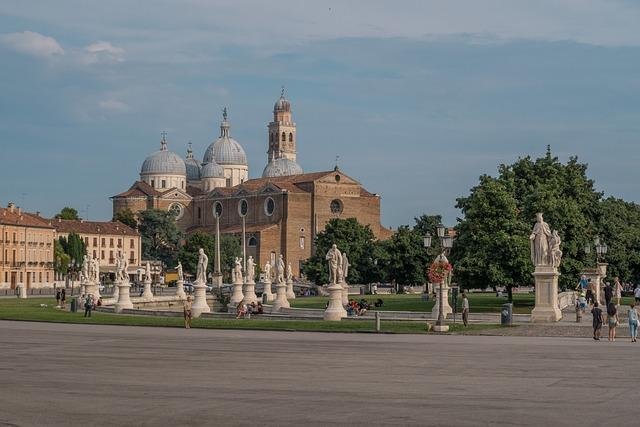If you’re a traveler with a passion for history, culture, and all things academia, Padua—nestled in the heart of Italy’s Veneto region—is a gem waiting to be discovered. This vibrant city boasts one of the oldest universities in the world, ancient schools, and a legacy of groundbreaking scholars. In this comprehensive guide, we’ll unveil the most intriguing facts about Padua’s educational institutions, share practical travel tips, and point you to the must-see scholarly sites that make Padua an essential destination for anyone interested in the crossroads of learning and adventure.
Why padua Should Be on Every Educational Traveler’s Itinerary
Padua (Padova in Italian) is renowned for its university, revolutionary academic achievements, and enduring spirit of innovation. Here’s why academic explorers should set their sights on this magical city:
- Historic Academic Legacy: Home to Europe’s second-oldest university, Padua’s scholarly influence spans nearly 800 years.
- Groundbreaking Discoveries: Legendary figures such as Galileo Galilei and elena Cornaro Piscopia made history here.
- Inspiring Heritage Sites: From medieval assembly halls to botanical gardens first of their kind, educational travelers are treated to an astonishing array of historic places.
Fascinating Facts about the University of Padua
Founded in 1222,the University of Padua (Università degli studi di Padova) is among the world’s oldest and most illustrious centers of learning. Discover some of its most captivating achievements and stories:
1. Galileo Galilei’s Academic Home
The famed astronomer,physicist,and mathematician Galileo Galilei taught at Padua from 1592 to 1610. during his tenure, he made pioneering observations using what was then an innovative telescope.Galileo affectionately called his time at the university “the best years of my life.”
2. The World’s First Anatomical Theater
The anatomical Theatre of Padua, created in 1594, is the oldest permanent anatomical theatre in the world. Uniquely designed for public dissections, it transformed the study of medicine and is still pictured in modern anatomy textbooks. Visitors can tour the original theatre inside Palazzo Bo, the university’s historic seat.
3. The First Female PhD Holder
Padua set a groundbreaking precedent in women’s education. Elena Cornaro Piscopia became the first woman in the world to earn a university degree—a Ph.D. in Beliefs—here in 1678.
4. Birthplace of Botanical and Scientific Discoveries
The Orto Botanico di Padova, established in 1545, is the world’s oldest academic botanical garden still at its original site. the garden fostered research not only in plant sciences but also in medicine and pharmacology—fields that revolutionized modern healthcare.
Must-See Educational Sites in Padua
Padua’s academic treasures are woven seamlessly into the cityscape. Here are the top educational landmarks every curious traveler should explore:
- Palazzo Bo: The heart of the university of Padua, Palazzo Bo is a living museum with sprawling halls, historic classrooms, the Anatomical Theatre, and Galileo’s notable podium.
- Orto Botanico di Padova: Stroll through this UNESCO World Heritage Site to see ancient medicinal plants and rare species, and admire the intricate geometrical pathways designed to facilitate scientific learning.
- Scuola del Santo (School of the Saint): founded in the 15th century, this brotherhood’s hall is adorned with masterpieces by Titian and showcases centuries of educational patronage.
- University Museum (Musei Universitari): Investigate centuries of innovation through collections of scientific instruments, anatomical models, and rare manuscripts.
- Statue of Elena Cornaro Piscopia: Honor the trailblazer of women’s education just steps away from the university’s central buildings.
Ancient Context: Padua’s Role in Shaping European Education
Padua’s universities and schools were crucial to the advancement of Renaissance humanism and the scientific revolution. while scholars flocked to study law,philosophy,and medicine,Padua’s halls also witnessed the beginnings of social change—championing freedom of thought and academic debate. Its medieval “free city” status gave students and teachers exceptional autonomy, a tradition still reflected in modern campus life.
Benefits of Educational Travel in Padua
Why should Padua be your next intellectual adventure? Here are key advantages for visiting students, educators, and lifelong learners:
- Deepen Your Historical Knowledge: Walking the corridors once traversed by Galileo cements your understanding of key scientific breakthroughs.
- Get Inspired by Innovation: Witness firsthand the sites of academic “firsts”, from early botanical research to women’s academic achievements.
- Cultural Immersion: Experience authentic Italian student life, from lively cafés to centuries-old traditions such as wearing laurel wreaths during graduation.
- Network with Scholars: The university’s international conferences and open lectures often welcome visitors and participants.
Practical Travel Tips for Visiting padua’s Educational Landmarks
To make the most of your scholarly journey, consider these essential tips:
- Guided Tours: Palazzo Bo and the Anatomical Theatre can only be explored with a guided tour—make reservations ahead of time, as spots fill up quickly, especially in summer.
- Opening Hours: The Orto Botanico, university museums, and some historic sites may close early or be shut on holidays. Double-check schedules before planning your itinerary.
- student Discounts: Many sites offer reduced admission for students and teachers; bring your ID or proof of status.
- Best Time to Visit: Avoid crowds in late spring or early autumn,when the city’s academic year is either winding down or gearing up,and temperatures are pleasant.
- Accessible Transport: Padua’s city center is compact and well-served by trams and buses, making walking between major educational attractions easy and enjoyable.
Personal Experience: An Afternoon Walking in Galileo’s Footsteps
Imagine stepping into a sunlit courtyard at Palazzo Bo, feeling the echo of centuries-old footsteps. Wandering the same halls as Galileo, you pass by painted walls and wood-carved lecture benches, each a silent witness to debates that changed the world. When the guide invites your group into the Anatomical Theatre, the steep, concentric galleries leave you marveling at how innovation and courage once converged in these very seats. As the tour ends, pausing for a cappuccino in a nearby piazza filled with students, you sense an inspiring continuity—the pursuit of knowledge, alive and buzzing, woven through Padua’s past and present.
Case Study: From Botanical Garden to nobel Laureates
Padua’s commitment to pioneering science doesn’t just rest in its past. The university has produced numerous nobel Prize winners,and its botanical garden continues to underpin critically important ecological research. Programs today draw international students to study climate change, biodiversity, and sustainable agriculture—making Padua a living laboratory at the heart of Europe.As a visitor, you’re not just seeing historic classrooms, but witnessing a hub of ongoing academic excellence and finding.
Frequently Asked Questions about Educational Travel in Padua
- Is the University of Padua open to visitors?
Yes, selected parts of the university—including Palazzo Bo and the Anatomical theatre—are accessible via guided tours. Some departments and events are open to the public, especially during academic festivals.
- How much time should I set aside for Padua’s educational sights?
A day is enough to experience the highlights, but academic enthusiasts may wish to spend two to three days to explore museums, the botanical garden, and historical neighborhoods in depth.
- Can I experience student life as a visitor?
Many university cafés, bookshops, and libraries welcome both locals and tourists. Attending a public lecture or cultural event provides authentic insight into Padua’s vibrant academic scene.
Conclusion: Let Padua ignite Your Passion for Learning
Padua is more than an Italian city of frescoes and piazzas; it’s a living tribute to the power of education and discovery.Whether you’re drawn by stories of Galileo, curious about the roots of modern medicine, or simply eager to wander in the footsteps of history’s great thinkers, Padua’s schools and universities offer a transformative travel experience. With its welcoming spirit, exceptional sites, and legacy of innovation, this city will enrich your understanding—and perhaps even inspire your own academic journey. Pack your notebook, brush up on Italian phrases, and prepare to make unforgettable memories in the scholarly heart of northern Italy.
ready for your educational adventure? Padua awaits—with centuries of wisdom at your fingertips.








0 Comments